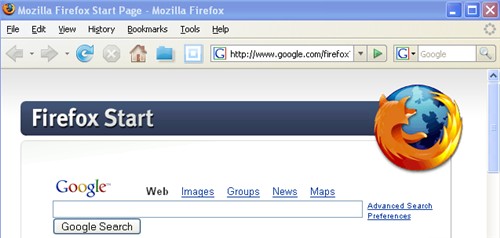Written by Alex Iskold and edited by Richard MacManus.
We wrote
recently about
the renewed web browser war between Microsoft and Mozilla (and some other, smaller,
usually very innovative players). Our theory is that in 2006 a lot of the ground work for
a major battle was laid out. Microsoft launched a
significant upgrade to Internet Explorer for the first time in about 5 years (IE7), while
the Firefox team spent time polishing up their
open source browser. But it is the latest developments which make it clear that Firefox
thinks it’s showtime. The first development was the Firefox ad
on Google’s home page. The second one was the annoucement
that Firefox is going to advertise on television (curiously our post on this didn’t seem
to get much reaction, but we thought it was big news). So in terms of the browser wars
Part II, the coding part is done and it is now all about the marketing.

Google is in Firefox’s corner now…
Looking at it with an eye on history, we could say this war is about old wounds.
Remember a decade ago when Netscape went down in flames? Well it’s not the original
Netscape team, but its spirit (in the form of Firefox) is coming back to haunt Redmond.
But the times have changed and so has everything else. Firefox is open source, slick and
marketing-savvy. It knows its ways around the new web far better than the dominant
Internet Explorer. It might not have the marketshare, but it certainly has the
mindshare.
But that is perhaps just sentimental talk. The fact is, this new war is not so much
about old wounds. It’s probably more about a multi-billion dollar advertising industry –
and perhaps even more than that.
Lets take a look at the evidence. Here they are, the Internet Explorer and Firefox
start pages:


Yes, that is right. It’s Google vs. Microsoft. Firefox is standing on the
shoulders of the number one web giant, Google, in this Browser war 2.0. Why is Google
supporting Firefox? In a word – default. In two words Power Law.
An old dog doesn’t forget old tricks
When it comes to architecture, Internet Explorer 7.0 takes after its rival Firefox.
Like Firefox, the new IE supports various extension points. One in particular to note
here is the search extension. In principle, anyone can write it – we have seen hundreds
written for Firefox. They search Amazon, del.icio.us, Yahoo! and many many other sites.
But only one of them is the default one. Just like all browsers come with a
default home page (again compare them in the pictures above), all browsers come with a
default search box.
Microsoft’s plan for grabbing Google’s advertising dollars relies simply on the fact
that people do not bother changing the default. When it comes to this sort of thing,
people behave like most things in nature. They follow the Power Law. This means that
exponentially many more people will not change the default. And exponentially many
times current IE install base times pay per click equals billions of
dollars. So here now we see the good old Microsoft that we have grown up to both
admire and hate.
To recap, Microsoft’s simple plan is this:
- Make Windows Live search good enough (except for Image Search, which is awesome)
- Roll out new Internet Explorer to the current user base
- Make the default search box in the browser Windows Live search
- Create idiot-proof videos that show how to use this new search box
- Marketing, Marketing, Marketing
- Kick back and watch the dollars roll in
- Last step, repeat above with Microsoft Office and all other windows applications
Viral Marketing 101
Some of you may think we are being too cynical – surely it can’t be true? Of course
this is true. This is business, with billions of dollars at stake. At the other end of
the spectrum, things are looking very serious too. Google has always been religious about
its home page appearance. Putting a Firefox ad on it is atypical of them – perhaps even
extreme. But Google knows what is coming in Vista – and so we have to assume that this is
a purposeful strategy to combat that.
In 2007, we think there is going to be a massive advertising campaign for Firefox. On
the Internet, on Social Networks and on public television. The message will be that Firefox is a better, safer,
faster browser. However, a lay person may not want to go the extra step to download it.
So Firefox has to be viral. The actual users of the browser are going to share their
enthusiasm and appreciation with others. They will do it relatively informally and no
doubt from the bottom of their hearts. And since they have nothing to gain personally, it
might just work.
The Search box is just the beginning, it’s not the end
The early days of the new Browser war is about ad clicks. But it is not
likely to stop there. Microsoft has no choice but to expand the war further, because it
has not been able to gain any ground on Google online. So since the online war is lost
(or at least not looking promising), it makes sense for Microsoft to fight back via the
browser. After all, some things never change – whoever controls the browser controls tens
of millions of eyeballs.
Ironically, the innovative Semantic Web, Smart Browsing and Attention technologies
that are in the spotlight for 2007 – are paving the road for Microsoft to control the
browser. Once these technologies evolve, the ‘sleeping’ giant from Redmond will have the
green light to repeat the simple plan, but deeper into the browsing experience. Now that
is truly scary – and we hope this is not going to happen.

















